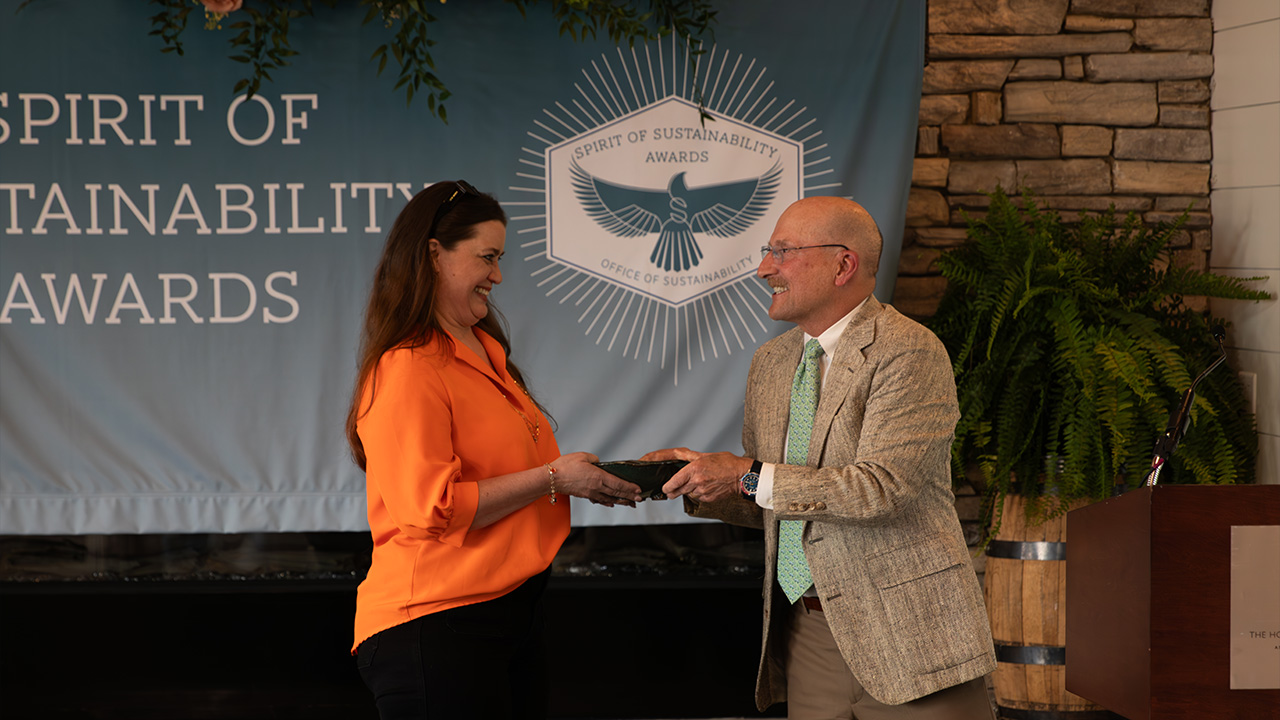content body

The Office of Sustainability hosted its annual Spirit of Sustainability Awards on April 23, honoring students, faculty, staff and alumni who have exhibited a commitment to excellence in sustainability on campus and in the community.
This year’s honorees represent a variety of work aimed at making a positive impact, including efforts to address sewage issues in rural areas, promoting environmentally conscious fashion design and advancing research and education to foster a healthier future.
“The Spirit of Sustainability Awards program is a wonderful initiative," said Mike Kensler, director of the Office of Sustainability. "It's an opportunity to tell the stories of unsung heroes, many working without much recognition, achieving exceptional outcomes that benefit humanity and the world around us.
"It is so wonderful to watch recipients standing in front of the awards program audience while their accomplishments and impacts are described and celebrated. It is a very special event.”
The recipients are:
Sociology graduate student Abosede Onifade in the College of Liberal Arts has contributed to projects addressing inadequate sewage systems in Alabama’s Black Belt. By analyzing water quality metrics, mapping sewage failures and creating databases for wastewater treatment providers, she actively worked to mitigate environmental disparities and promote public health.
Ummi Hani Barsha, a doctoral student in consumer and design sciences in the College of Human Sciences, focuses on exploring the integration of environmentally friendly materials and practices into contemporary fashion, aiming to reduce the industry’s environmental footprint. Her own designs exemplify a commitment to combining ethical fashion with aesthetics and functionality.
Yaqub Adediji, a doctoral student in materials engineering in the Samuel Ginn College of Engineering, is a renewable energy, climate and sustainability enthusiast. He won numerous awards and continues to research the development of non-destructive corrosion monitoring and detection systems in aerospace and renewable energy systems.
Christopher Lepczyk, an Alumni Professor in the College of Forestry, Wildlife and Environment, is dedicated to understanding factors negatively affecting nature using a socioecological-systems approach aimed at improving policy and management of species, land and society to restore nature.
Benjamin Bowers, the McCartney-Chase Highway Engineering Distinguished Associate Professor, aims to contribute to environmentally friendly civil engineering education and practice, including helping craft the National Asphalt Pavement Association’s climate goals and creating Auburn’s Sustainable Transportation Infrastructure course.
Dawn Michaelson, an assistant professor in consumer and design sciences, has collaborated with brands, non-profits and students to bridge the gap between sustainability and accessibility in the fashion industry. She has led projects to address adaptable costumes for children with disabilities and size-inclusive clothing solutions.
Jim Godwin is an aquatic zoologist with the Alabama Natural Heritage program in Auburn’s Museum of Natural History. His work includes evaluating populations and critical habitats for imperiled species throughout the state and beyond. He led the efforts to reintroduce the indigo snake to southern Alabama.
The Rural Health Initiative is a collaborative effort of University Outreach, Alabama Cooperative Extension System and the colleges of Pharmacy, Nursing, Human Sciences and Education and the Speech, Language and Hearing Sciences program, to address health disparities across rural Alabama. The work is not only improving health outcomes but promoting health care solutions in underserved areas.
The Stormwater Research Facility, in the Department of Civil and Environmental Engineering, has provided practical solutions to address environmental challenges posed by stormwater runoff. Research findings have been adopted as standard practice by several states. Through outreach and training, faculty share knowledge on improved ways of installing, maintaining and inspecting various stormwater management practices.
The Horst Schulze School of Hospitality Management in the College of Human Sciences has established a comprehensive initiative aimed at addressing critical issues such as food waste and food insecurity while educating the next generation of hospitality leaders. It emphasizes ultra-local food sourcing, composting and community-focused food donation efforts to feed the food insecure locally.
Integrated Aquaculture for Food Production, Education, Empowerment and Development (iFEED) is a transdisciplinary social action initiative that leverages agriculture and social work to accelerate action on the Sustainable Development Goals to reduce poverty and hunger, promote good health and well-being and quality education in Liberia.
Submitted by: dro0011@auburn.edu




